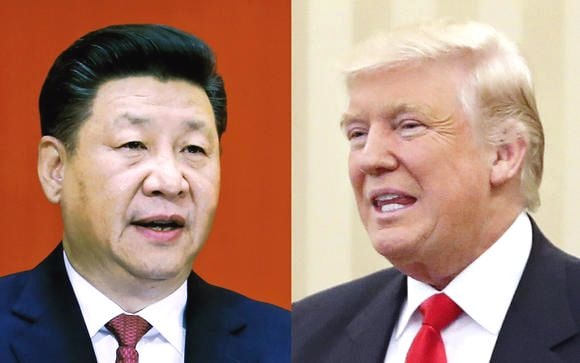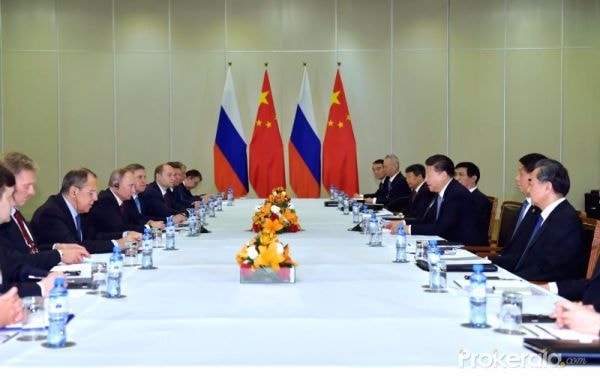Trump's policy gives China the 'key' to rise
(Baonghean) - The protectionist policy of the future President of the United States, Donald Trump, and China's ambition to impose the rules of the game on the trade chessboard are the issues that covered the 24th Asia-Pacific Economic Cooperation (APEC) Summit held in Peru on November 19 and 20, 2016. The two issues seem to be separate, but according to observers, Trump's policy seems to be handing over the "key" to China's rise.
Concerns about protectionist policies
For a forum that promotes global free trade, having a person as openly opposed to free trade agreements as US President-elect Donald Trump is sure to be a prominent topic on the Lima conference's agenda.
During his presidential campaign, Donald Trump repeatedly asserted that he would withdraw from the Trans-Pacific Partnership (TPP) on the grounds that the agreement would take away many jobs from the American people. Although at APEC this time, President Barack Obama still believed that Trump would see the benefits of the TPP once he took over the presidency and would reconsider. However, many people could not help but doubt the "fate" of the TPP, especially after Trump was elected, a number of senior officials of the Obama administration admitted that there was no more chance of passing the TPP. Some scholars, although very optimistic, had to "bitterly" admit that "the TPP is not dead, but will certainly fall into a deep sleep".
 |
| Chinese President Xi Jinping (left) and US President-elect Donald Trump. Photo: Reuters |
Not only threatening the TPP, during his election campaign, US President-elect Donald Trump also announced that he would renegotiate the North American Free Trade Agreement (NAFTA) including the US, Mexico and Canada as well as the free trade area with Latin America, causing great concern for countries in the region.
However, concerns about the future of TPP or NAFTA are only part of it. Mr. Trump's trade protectionism is what is causing the biggest headache for world leaders, who are worried about a global trade war. Right at the opening session of the APEC Summit, Peruvian President Pedro Pablo Kuczynski affirmed: "The world is threatened by protectionism and I think APEC is a very good forum to fight against that." In a statement aimed at Mr. Trump's anti-trade stance, President Kuczynski emphasized that "anyone who wants to defend protectionism needs to read the economic history of the 1930s."
In fact, in a globalized and open world, if the world's number 1 economy, the US, adopts protectionist policies, trade and investment everywhere will stagnate. According to Professor Robert Lawrence, who teaches at Harvard University, "not only will the US no longer play a leading role in the economic integration process, but the US under Donald Trump will also change the order on the international trade chessboard."
Aware of the threats of rising protectionism, APEC Secretary General Eduard Pedrosa predicted that the 24th APEC Forum would issue a “strong” statement in defense of free trade, especially since, to date, “there has been no concrete and clear evidence to prove that trade flows are the cause of job losses in some countries.”
China is ready to rise
In the context of the increasingly uncertain future of the TPP Agreement, the countries in the Asia Pacific region are confused about how to find a way out if the TPP is "abandoned", China has taken this opportunity to be ready to fill the "void" left by the US. Beijing is promoting two other solutions to replace the TPP, one is the Free Trade Area (FTAAP) with 21 members and the Regional Comprehensive Economic Partnership (RCEP) with 16 members, notably RCEP will have India participating but not the US.
 |
| Leaders of Russia and China discussed free trade on the sidelines of the APEC Summit in Peru. Photo: RT |
In Peru's capital Lima, Chinese President Xi Jinping made no secret of his intention to push for RCEP to be completed as soon as possible, especially when key TPP members such as Japan, Australia and Singapore are leaving open the possibility of focusing on the China-led trade agreement instead of TPP.
According to the assessment, although RCEP has certain differences with TPP, especially in promoting reforms in member countries, its appeal is not less than TPP. RCEP's approach is to promote increased trade, mainly focusing on reducing tariffs, while TPP focuses on reducing non-tariff barriers, improving labor and environmental conditions. In the long term, the high standards of TPP will achieve positive results in many aspects, not just economic, while the short-term benefits (such as trade) of RCEP are very clear.
The Chinese government’s goal at the APEC Summit in Peru this time is to push for the RCEP negotiations to be completed this year, before being ratified by member countries. It is hoped that the stalling and risk of collapse of the TPP will help resolve the disagreements in negotiations in areas such as agriculture and foreign investment quickly.
Experts say that, up to now, free trade agreements are not purely economic issues, but include a profound geopolitical balance, especially on the strategic chessboard between China and the US in the Asia-Pacific region.
It is not clear what the specific directions and policies of Mr. Donald Trump - the 45th President of the United States will be, whether he will continue to pursue trade protectionism. But clearly, Mr. Trump's campaign statements are creating opportunities for China and Beijing is trying to seize them as quickly as possible to "feed" its ambition to dominate global trade.
Thanh Huyen
| RELATED NEWS |
|---|






